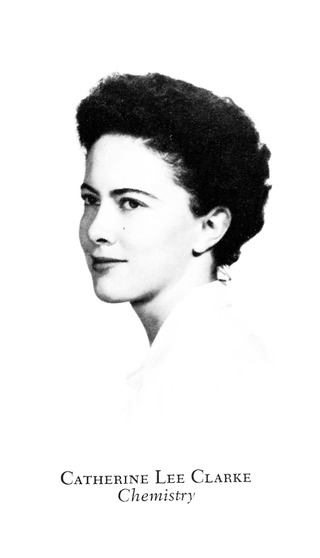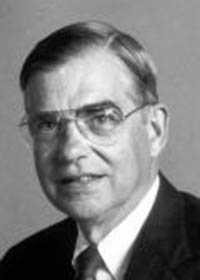Related Research Articles
The American Society for Mass Spectrometry (ASMS) is a professional association based in the United States that supports the scientific field of mass spectrometry. As of 2018, the society had approximately 10,000 members primarily from the US, but also from around the world. The society holds a large annual meeting, typically in late May or early June as well as other topical conferences and workshops. The society publishes the Journal of the American Society for Mass Spectrometry.
Robert Graham Cooks is the Henry Bohn Hass Distinguished Professor of Chemistry in the Aston Laboratories for Mass Spectrometry at Purdue University. He is an ISI Highly Cited Chemist, with over 1,000 publications and an H-index of 150.
Michael T. Bowers is an American mass spectrometrist, a professor in the department of chemistry and biochemistry at the University of California, Santa Barbara faculty.

David E. Clemmer is an analytical chemist and the Distinguished Professor and Robert and Marjorie Mann Chair of Chemistry at Indiana University in Bloomington, Indiana, where he leads the Clemmer Group. Clemmer develops new scientific instruments for ion mobility mass spectrometry (IMS/MS), including the first instrument for nested ion-mobility time-of-flight mass spectrometry. He has received a number of awards, including the Biemann Medal in 2006 "for his pioneering contributions to the integration of ion mobility separations with a variety of mass spectrometry technologies."
Scott A. McLuckey is an American chemist, the John A. Leighty Distinguished Professor of Chemistry at Purdue University. His research concerns the formation of ionized versions of large biomolecules, mass spectrometry of these ions, and ion-ion reactions.
Veronica Vaida is a Romanian-Hungarian-American chemist and professor at the University of Colorado Boulder. She is an expert in environmental chemistry and aerosols.

Catherine Clarke Fenselau is an American scientist who was the first trained mass spectrometrist on the faculty of an American medical school; she joined Johns Hopkins School of Medicine in 1968. She specializes in biomedical applications of mass spectrometry. She has been recognized as an outstanding scientist in the field of bioanalytical chemistry because of her work using mass spectrometry to study biomolecules.

Charles Herbert DePuy was an American chemist known for his work in gas phase organic ion chemistry.

Atmospheric pressure photoionization (APPI) is a soft ionization method used in mass spectrometry (MS) usually coupled to liquid chromatography (LC). Molecules are ionized using a vacuum ultraviolet (VUV) light source operating at atmospheric pressure, either by direct absorption followed by electron ejection or through ionization of a dopant molecule that leads to chemical ionization of target molecules. The sample is usually a solvent spray that is vaporized by nebulization and heat. The benefit of APPI is that it ionizes molecules across a broad range of polarity and is particularly useful for ionization of low polarity molecules for which other popular ionization methods such as electrospray ionization (ESI) and atmospheric pressure chemical ionization (APCI) are less suitable. It is also less prone to ion suppression and matrix effects compared to ESI and APCI and typically has a wide linear dynamic range. The application of APPI with LC/MS is commonly used for analysis of petroleum compounds, pesticides, steroids, and drug metabolites lacking polar functional groups and is being extensively deployed for ambient ionization particularly for explosives detection in security applications.

Robert Reed Squires was an American chemist known for his work in gas phase ion chemistry and flowing afterglow mass spectrometry.
Vicki Wysocki is an American scientist. She is a professor and an Ohio Eminent Scholar at Ohio State University, and also the director of the Campus Chemical Instrument Center.
Richard M. Caprioli is an American chemist known for his contributions to mass spectrometry imaging.
Alison E Ashcroft is a British chemist and Emeritus Professor of Biomolecular Mass Spectrometry at the University of Leeds. Her work is focused on method development in mass spectrometry to study protein folding and protein aggregation in relation to diseases.

Julia Laskin is the William F. and Patty J. Miller Professor of Analytical Chemistry at Purdue University. Her research is focused on the fundamental understanding of ion-surface collisions, understanding of phenomena underlying chemical analysis of large molecules in complex heterogeneous environments, and the development of new instrumentation and methods in preparative and imaging mass spectrometry.
Catherine E. Costello is the William Fairfield Warren distinguished professor in the department of biochemistry, Cell Biology and Genomics, and the director of the Center for Biomedical Mass Spectrometry at the Boston University School of Medicine.
Lingjun Li is a Professor in the School of Pharmacy and Department of Chemistry at University of Wisconsin-Madison. She develops mass spectrometry based tools to study neuropeptides, peptide hormones and neurotransmitters.
Hilkka Inkeri Kenttämaa is a researcher in organic and bioorganic mass spectrometry, and the Frank Brown Endowed Distinguished Professor of Chemistry at Purdue University. She is a pioneer in distonic radical cation research and laser-induced acoustic desorption.
Barbara Seliger Larsen is a mass spectrometrist, with a career in instrumentations and applications of mass spectrometry in industry, and served on the board of the American Society for Mass Spectrometry for several terms.

Erin Shammel Baker is an American bioanalytical chemist specializing in developing ion mobility-mass spectrometry hybrid instruments for biological and environmental applications. Baker is an expert in the research of perfluoroalkyl and polyfluoroalkyl substances analysis.
References
- 1 2 "2021 ACS National Award winners—Part I". C&EN. 99 (1): 36–39. 2021-01-04. doi: 10.1021/cen-09901-awards1 . S2CID 241433496.
- ↑ "Pennsylvania Junior Academy of Science State Winners". Proceedings of the Pennsylvania Academy of Science. 39 (1): 37–44. 1965. JSTOR 44110420 . Retrieved 2022-06-05.
- ↑ Gross, Michael L. (1999-03-01). "JASMS welcomes Veronica Bierbaum as new associate editor". Journal of the American Society for Mass Spectrometry. 1999 (10): 199. doi: 10.1016/S1044-0305(98)00163-9 . S2CID 192585711.
- ↑ "Past Presidents". American Society for Mass Spectrometry . Retrieved 2022-06-05.
- ↑ "ASMS Board of Directors History" (PDF). American Society for Mass Spectrometry . Retrieved 2022-06-05.
- ↑ "JASMS editors at ASMS" (PDF). News and Views August 2019. American Society for Mass Spectrometry . Retrieved 2022-06-05.
- ↑ "Veronica Bierbaum". University of Colorado, Boulder. 9 October 2015. Retrieved 2022-06-05.